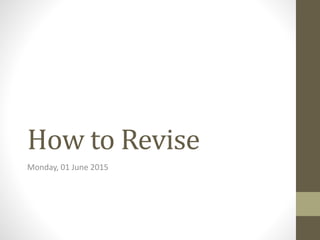Revision techniques for KS3's tests - BVIS Ho Chi Minh city
•Descargar como PPTX, PDF•
3 recomendaciones•760 vistas
The document provides tips for effective revision and exam preparation. It recommends not worrying, focusing revision on unknown topics rather than just reviewing what is already known, and planning revision to cover all necessary material by the exam date. It suggests using cues like color, smell, and taste to help remember information. Various revision techniques are outlined, including flashcards, flow charts, mind maps, rhyming, highlighting notes, using post-it notes, reading aloud, and discussing topics with friends. The key is finding the methods that work best for each individual student.
Denunciar
Compartir
Denunciar
Compartir

Recomendados
Recomendados
Más contenido relacionado
La actualidad más candente
La actualidad más candente (19)
Destacado
Destacado (12)
Design for Forgetting: Disposing of Digital Possessions After a Breakup

Design for Forgetting: Disposing of Digital Possessions After a Breakup
Similar a Revision techniques for KS3's tests - BVIS Ho Chi Minh city
Similar a Revision techniques for KS3's tests - BVIS Ho Chi Minh city (20)
BCS written exam preparation and BCS Preliminary exam preparation

BCS written exam preparation and BCS Preliminary exam preparation
Más de bvisvietnam
Más de bvisvietnam (20)
Último
https://app.box.com/s/7hlvjxjalkrik7fb082xx3jk7xd7liz3TỔNG ÔN TẬP THI VÀO LỚP 10 MÔN TIẾNG ANH NĂM HỌC 2023 - 2024 CÓ ĐÁP ÁN (NGỮ Â...

TỔNG ÔN TẬP THI VÀO LỚP 10 MÔN TIẾNG ANH NĂM HỌC 2023 - 2024 CÓ ĐÁP ÁN (NGỮ Â...Nguyen Thanh Tu Collection
Último (20)
This PowerPoint helps students to consider the concept of infinity.

This PowerPoint helps students to consider the concept of infinity.
Micro-Scholarship, What it is, How can it help me.pdf

Micro-Scholarship, What it is, How can it help me.pdf
Salient Features of India constitution especially power and functions

Salient Features of India constitution especially power and functions
Jual Obat Aborsi Hongkong ( Asli No.1 ) 085657271886 Obat Penggugur Kandungan...

Jual Obat Aborsi Hongkong ( Asli No.1 ) 085657271886 Obat Penggugur Kandungan...
Food safety_Challenges food safety laboratories_.pdf

Food safety_Challenges food safety laboratories_.pdf
Mixin Classes in Odoo 17 How to Extend Models Using Mixin Classes

Mixin Classes in Odoo 17 How to Extend Models Using Mixin Classes
TỔNG ÔN TẬP THI VÀO LỚP 10 MÔN TIẾNG ANH NĂM HỌC 2023 - 2024 CÓ ĐÁP ÁN (NGỮ Â...

TỔNG ÔN TẬP THI VÀO LỚP 10 MÔN TIẾNG ANH NĂM HỌC 2023 - 2024 CÓ ĐÁP ÁN (NGỮ Â...
Revision techniques for KS3's tests - BVIS Ho Chi Minh city
- 1. How to Revise Monday, 01 June 2015
- 2. Help! I don’t know how to revise!
- 3. What is the point of revision? It is to remember things. The best way to remember is through cues. A cue is something that you associate with something else.
- 4. Colour, Smell, Taste, Sound All things that you have at your fingertips.
- 5. The first rule of revision: Don’t worry. Worrying will put you off and stop you from doing anything at all.
- 6. Second rule of revision Do not take the easy option and go over only the things that you already know. This might make you feel better (and boost your confidence) but actually is of little benefit.
- 7. Third rule of revision Find out exactly what you need to know! Look at the textbook or revision guide– this will often summarise what you need to know.
- 8. Final Rule: Plan your revision. There’s no point in trying to cram too much in. You know when your exam is. What will you need to cover by that date?
- 9. How can I revise then? Everyone is different and so you all have different things that work for you. It isn’t a good idea to write out all of your notes all over again. There are so many things you can try:
- 10. Revision Cards Write a keyword on a card using your textbook for cues. Read the relevant part of the textbook. Come back to your cards and try to write notes on them (this tests your memory) You can then flick through the cards to help you remember.
- 11. Flow Charts This breaks down the information you need into small chunks.
- 12. Spider Diagrams
- 13. Mind Maps
- 15. Lists Write lists – Use colour Different pens / paper
- 16. Highlight Notes • Go through your existing notes with a highlighter. This way your attention is drawn to important bits.
- 17. Use post it notes All around your house – put keywords in the toilet, on your bedroom wall, on your tv etc
- 18. Read out loud • Record the information onto your phone/ipad and listen back to it.
- 19. Talk to your friends Talking about it can help. Have a revision party!
- 20. It is not all about facts Learning facts is only part of the battle. You need to arrange your thoughts on paper and make sure you answer the question.
